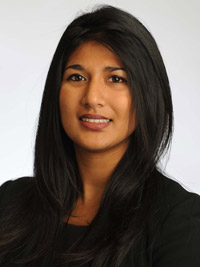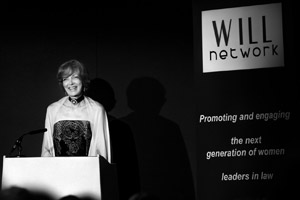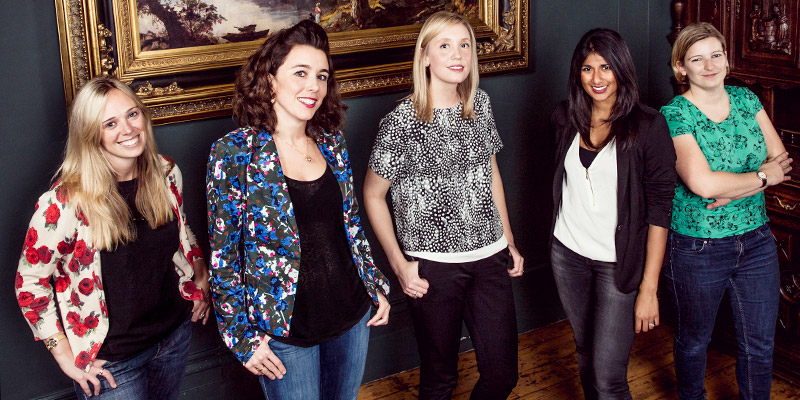Fatema Orjela is a partner at Kirkland & Ellis LLP and a co-founder of Women in Law London (WILL), a professional network aimed at associate level solicitors to create professional opportunities through networking and personal development. WILL was founded in October 2014 and already has 1,600 members and champions across London. Despite its focus on more junior women, WILL is encouraging more senior women to sign up as ‘WILL Champions’ and attend its events so that its members can network upwards to benefit from the experience and advice of those who have taken this path before them.

“…Our members have voiced their concern that certain solutions implemented internally appear to be mere ‘lip service’ without ‘substance’. We’d like to help those firms seeking to increase the perceived credibility of their initiatives amongst female staff by acting as an external sounding board…”
Fatema, please can you tell us about your career to date and what got you interested in working as a lawyer?
I started my training contract at Lovells LLP (now Hogan Lovells International LLP) in February 2007, qualifying into the private equity (corporate) practice in February 2009. I then moved over to Kirkland & Ellis International LLP in August 2011.
I enjoy working as a lawyer for two main reasons: First, I get an adrenaline kick out of problem solving, especially where the solutions tend to require complex out-of-the-box solutions delivered in a commercial, efficient and pragmatic way.
Secondly, I am fascinated by people and as a private equity lawyer, I am exposed to a broad range of different relationships – lawyer to client, law firm internal, client internal, between lawyers (opposing / acting jointly), between clients (opposing / acting jointly), sponsor clients to target management, founders to new management etc.
For our readers without a legal background, what does your role entail and what are the key skills you need to be successful?
I advise clients as to their buying/selling of businesses (often international and market leaders in the industry). The acquisition / sale involves my team’s assistance with structuring the deal, diligencing the business to ensure that our client is informed as to what it is buying or how to disclose information (as applicable for buy / sale side), advising the client as to the terms of the deal and taking a front seat to drive the related negotiations.
Further, management and co-investors tend to be key players in private equity transactions, given our clients typically don’t just want to buy ‘the car’, but ‘the car plus the driver’ and investment can be seen as pivotal depending on the life cycle of a business. A large part of my practice thus involves advising clients as to governance, investment, liquidity, management incentive and other such arrangements applicable during the period of ownership.
As to skills, sharp legal technical ability is a must to provide one with the best toolbox. Thereafter, from a transactional perspective, even where interim positions on a transaction appear to be in conflict (e.g. buy / sell), the end goals are often aligned (e.g. completion of the transaction), so the ability to smoothly problem solve and understand people in order to navigate the different dynamics, influence and bring parties together to reach that common goal, is to my mind, key.
You’re a partner in your firm. What are the greatest challenges for women looking to progress from associate level to partnership?
From speaking to members of WILL, women appear to be frustrated or put off by the lack of transparency over their paths to partnership, and continued scarcity of senior female role models (despite women overwhelmingly dominating the legal profession up to the age of 36 – a senior age in terms of partnership promotion – and being in the majority up to 40), which both result in weak perceptions as to promotion opportunities generally.
Enabling women to gain clarity and increasing the number of female role models (a somewhat circular issue) remains a challenge. This is highlighted by the results of our WILL Survey. Although diversity discussions still widely tend to focus on work / life balance (sometimes as an excuse for bad practices or a distraction tactic), promotion perceptions appear to actually link more strongly to career satisfaction and firm commitment. Finding mentors and sponsors can really help to give associates the insight required internally.
Law firms are known for being pressurised environments with long hours. How easy it is to manage your work-life balance, especially when you’re working in an international firm with overseas clients in different time zones?
Given breakthroughs in technology and the ever increasing pace of transactions, the 9-to-5 (plus overtime) view of a day in the office seems outdated for a number of City professions, including transactional law.
The notion of a split between work / life no longer seems relevant. I can work from my desk, on the move, in the week, over the weekend, and equally, intertwine my family / social life, in between – the lines are blurred. For me, the crucial aspect has been autonomy. It gets easier as you get more senior, but I have certainly always been fortunate to have been made to feel as though I have some semblance of control, despite being at the sharp end of service provision.
If on a U.S. deal, the mornings might be clearer, an Asian deal, the evenings. If a deal is signing / closing, there’ll be a few days push and when it’s done, typically a lull and so forth. Top quality advice can be given, and work can be carried out and delivered, from anywhere.
I try to give my team workstreams to run, windows of time to work in, and the ability to make their own scheduling decisions. Overall, to be able to give people autonomy, whilst also being on hand to deliver a quality service requires the team to pitch in to help each other as appropriate and good communication (internal and external) so that we’re all working to the same beat.
Please can you tell us about Women in Law London (WILL) and what made you decide to work with your other co-founders to set up a new organisation?
Women in Law London (WILL) was founded by Sascha Grimm, Suzanne Szczetnikowicz, Sophie Bragg, Ellen Hughes-Jones and me (whilst I was an associate) after unsuccessfully trying to find a network aimed at pre-partnership (or top level in-house) women lawyers.
It was clear there was a big gap in London at this level, which was surprising given the low partnership figures for women (24% in 2014), set against the high entry rates to the profession (over 50% for the last 20 years). The reality is that the profession is losing talented women and the trend is not reversing at a sufficient rate. We wanted to better understand why, from the perspective of our peers, the ones actually leaving or most at risk of leaving, the profession.
We want to provide women with a supportive and dynamic network to encourage them to aspire to leadership and assist them in attaining it, both through the development of mentoring and sponsorship relationships, and also by enabling introduction to more senior women (WILL Champions) who can offer the benefit of their experience.
What sort of events and activities do you organise and what has the response been like?
We run a range of events including:
(1) Keynote speaker events – Dame Fiona Woolf DBE (CMS Cameron McKenna and former Lord Mayor of London) and Shami Chakrabarti (Director of Liberty) to date;
(2) Topical panel discussions – Recent panel included Funke Abimbola (Roche), Tamara Box (Reed Smith and the 30% Club), Philip Goodstone (EY), and Nicholas Cheffings (Hogan Lovells);
(3) WILL Supper Clubs with the London Foodie;
(4) WILL Wednesdays – casual monthly drinks in a local bar;
(5) Sweatworking -spin cycling and networking;
(6) WILL Power – coaching and CV sessions and;
(7) WILL Connect – a forum for firm representatives to speak candidly about diversity initiatives.

We also commissioned the WILL Survey with Kings’ College London over the summer, which has been carried out by over 320 women across the City. We have released our headline results with a number of statistically significant data hits (such as the fact that only 12.5% of respondents felt that their firm / company linked diversity and inclusion to performance / reward). More results to follow in due course once the qualitative testing has been completed.
The response to events has been fantastic, with typically 180-200 acceptances for formal events and regular attendees at the informal events. We have also had incredible support from our WILL Champions keen to bridge the gap and help provide guidance to our members.
What is your advice for women and girls who are interested in legal careers about how to set yourself apart from the competition in a crowded market?
Go out and speak to people in the profession. Firm brochures and talks can help give a framework of information. However, as everyone’s story is so different and people tend to be keen to share, there is a wealth of knowledge to be learnt through discussions to help fill in the gaps.
What is next for you and WILL?
We will continue to seek to grow the membership of WILL, arrange lively and captivating events and provide opportunities for women across the City to meet, share ideas and build their own networks.
Using the results of the WILL Survey, we also hope to engage with firms to encourage them to recognise the importance of diversity on the bottom line and incentivise management to commit to the cause. Our members have voiced their concern that certain solutions implemented internally appear to be mere ‘lip service’ without ‘substance’. We’d like to help those firms seeking to increase the perceived credibility of their initiatives amongst female staff by acting as an external sounding board.
The will for the tide to push forward has been and is still there. It’s for our generation now to pick up and keep the momentum going to stop the tide from receding.
http://www.kirkland.com/fatema_orjela
http://www.womeninlawlondon.com/
https://twitter.com/womeninlawlon





